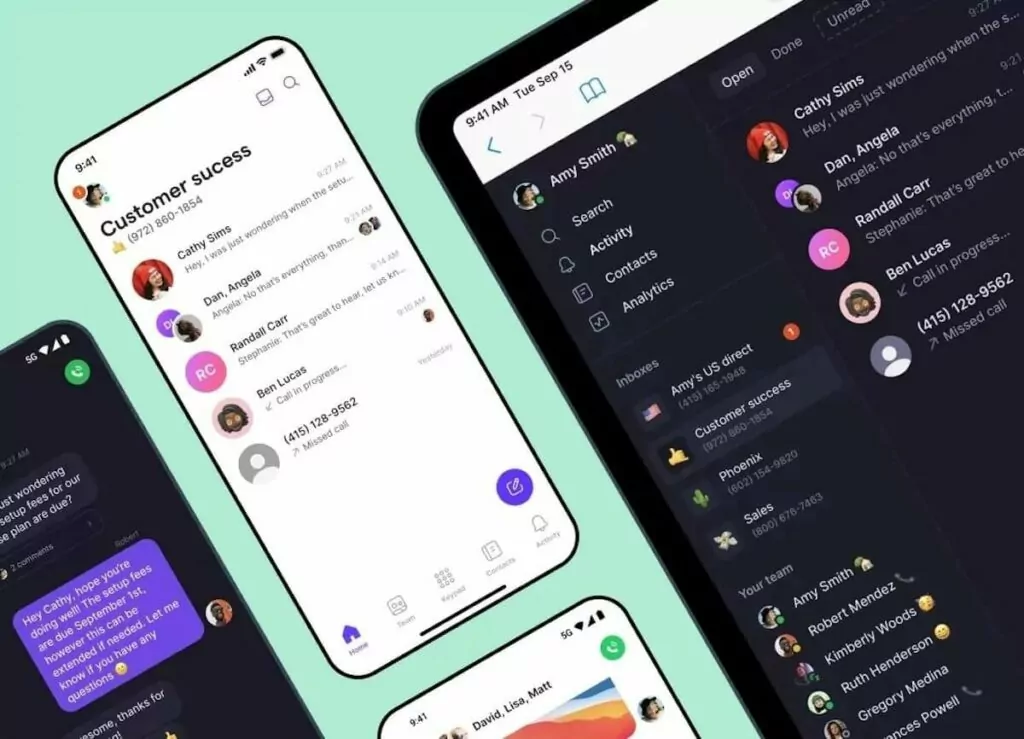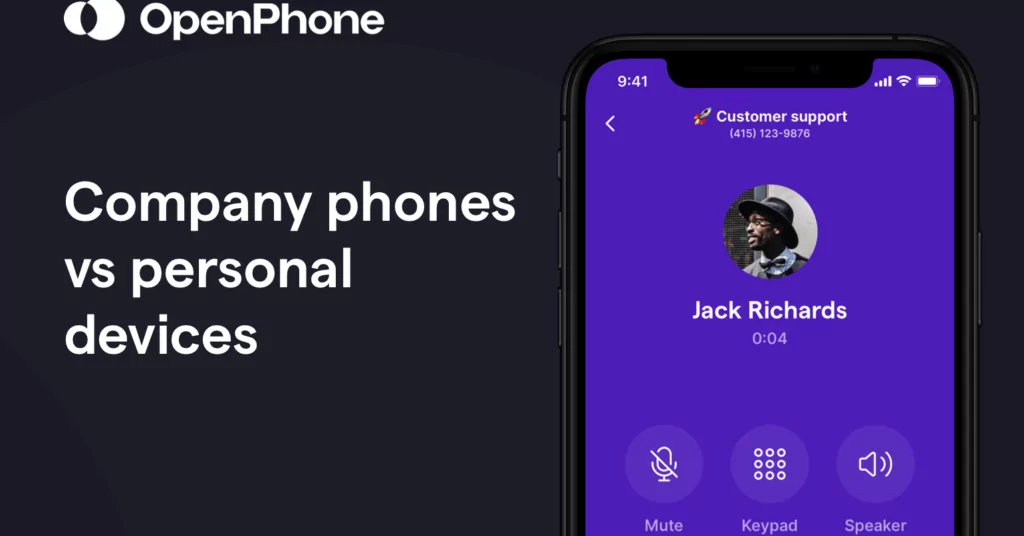Phone calls and text messaging may be the beating heart of your business.
But if your employees don’t spend all their working hours in one spot and need to conduct business on the go, it’s time to say goodbye to the traditional desk phone and say hello to mobile phones.
62.5% of adults in the US don’t have a landline phone. And many organizations are keeping up with the times, either equipping their workforce with a company-issued mobile phone or allowing them to bring their own.
Each option has its pros and cons. So if you’re wondering which option is best for your business, you’ve come to the right place.
CYOD, COBO, COPE, and BYOD?!
As you learn more about whether or not your company should issue employees a dedicated mobile phone for work or allow them to use their personal device, you’ll come across four acronyms (CYOD, BODO, COPE, and BYOD) and wonder what the heck they mean.
Let’s decode CYOD, BODO, COPE, and BYOD policies.
CYOD (choose your own device)
This company-issued phone device policy lets employees choose from a list of approved devices. Under this policy, the business completely control’s over the device’s usage and security measures
COBO (company-owned business only)
This company-issued phone policy is on the opposite end of the spectrum from CYOD. Under this policy, employees have no choice in which device they’re issued. They are also prohibited from using the device for anything but business purposes.
COPE (company-owned personally enabled)
This is a company-issued device policy that either the employee chooses or the employer chooses for them — except they’re granted some personal use of the device.
BYOD (bring your own device)
This is an employee-owned device policy that essentially outlines how your employees can use their personal phones for work tasks. (By the way, if you go this route, follow these tips to create a BYOD policy for your team.)
BYOD vs CYOD vs COBO vs COPE: Moving past the acronyms
The business world loves acronyms. But as you can see, these four-letter abbreviations are simply variations of two choices — of which, we’ll dive into the pros and cons of each next.
The pros and cons of company-owned phones
In this case, the company provides employees with company-issued cell phones to use for business purposes. There are a few pros and cons to this approach.
Pros:
- Company-owned phones are tax-deductible.
- Company-owned mobile devices allow your team to work remotely and on the go.
- Company-owned smartphones offer employers more control over the device.
Cons:
- Company-owned phones aren’t cheap. According to Samsung, a 250-employee organization can expect to pay $1,234 per employee per year for mobile enablement.
- Company-owned phones require additional IT team resources to minimize security risks, troubleshoot issues, and maintain the hardware.
- At least a third of employees will use a company-owned phone for personal tasks, increasing the chances of a company data breach or malware infection.
The pros and cons of employee-owned phones
Since most employees already have cell phones, why not simply have them use their own devices for work? This is a popular approach among companies, who will then reimburse employees — fully or partially — for any business expenses they incur.
Pros:
- Employee-owned phones save businesses an average of $652 per employee per year on mobile phone costs.
- Employee-owned phones allow employees to choose their preferred device, rather than whatever device your company has opted for.
- Employee-owned phones require minimal IT resources to minimize security risks, troubleshoot issues, and maintain the hardware.
- Employees can hit the ground running quicker when joining your team using their personal phones for work. They won’t run into any stumbling blocks navigating a different operating system.
Cons:
- With some exceptions (more on this in a bit), employee-owned phones are more vulnerable to cybersecurity attacks because employers have limited control over how sensitive company information is managed on them.
- Employee-owned phones aren’t a given. Some employees (at least 15% of American adults) may not own their own and feel excluded when asked to use one for work.
- Employee-owned phones significantly blur the lines between an employee’s work and personal lives, which could harm their work-life balance. Fortunately, your team can put specific apps in place to set clear boundaries.
Why a BYOD policy is the ideal choice
As I said a moment ago, with some exceptions, employee-owned phones are vulnerable to cybersecurity attacks. The exception to the rule is a solid BYOD (bring your own device) policy.
Your BYOD policy should address all the potential concerns related to allowing employees to use their personal devices for work. Should employees expect privacy? Will employers help troubleshoot issues?
Creating your BYOD policy is half the battle. Once drafted and approved, it has to be implemented — which can be tricky without the proper tools.
The right apps can make all the difference. Here’s a list of our favorites:
- Rippling (device security): Device management solutions like Rippling allow employers to effortlessly manage employee apps, devices, data, and security – 100% remotely – in one unified system.
- LastPass (passwords): With LastPass, you can eliminate employee password reuse with their integrated Password Generator, manage passwords from one place, protect sensitive data with their zero-knowledge security model, and share passwords simply and safely.
- Okta (applications): With SSO, your employees can use one set of login credentials – for example, a name and password – to access multiple applications. A solution like Okta can help your employees log in to work apps faster without sacrificing security.
- Vanta (compliance): Vanta helps companies achieve SOC 2, ISO 27001, HIPAA, PCI, and GDPR compliance by automating their security monitoring, getting them security audit-ready in weeks instead of months. Just connect your tools, fix the gaps, and then work with a Vanta-trained auditor to complete your audit.
- OpenPhone (business phone numbers): VoIP providers like OpenPhone allow employees to add work phone numbers to their existing devices – essentially turning their personal devices into a company phone without needing help from the IT department.
More than just a business phone number

If you choose to allow employees to use their owned devices to make business calls and close deals via text, you’ll want to sign up for a free trial with OpenPhone.
Why? OpenPhone isn’t just a business phone number. It’s a business phone system that gives you control over the customer experience and ensures business continuity. It’s an app that allows your teams to share phone numbers and guarantee every customer call is answered — whether they’re on vacation or maintaining a work/life balance after business hours. All work-related activities around conducting business over the phone are in a separate app so they can relax and always know if incoming calls are for work.
Find out what OpenPhone can do for your business today. Sign up for a free seven-day trial to try it out for yourself or reach out to speak to one of our product specialists.

